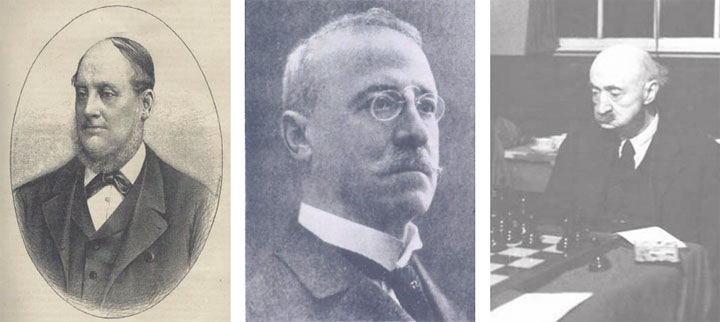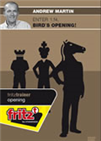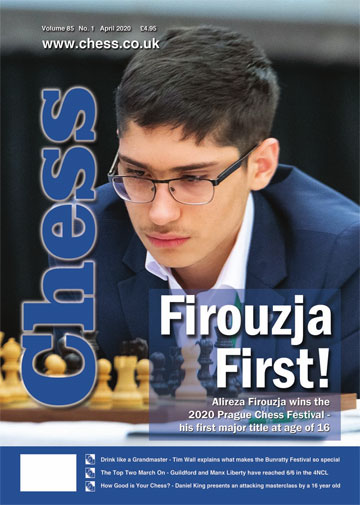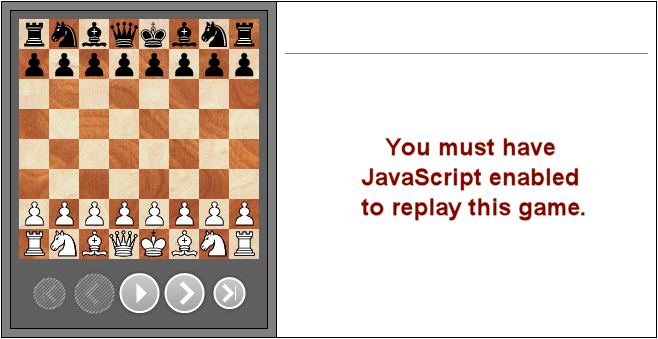How many links connect you to Paul Morphy?
A narrative by Bob Jones
Back in the day, there used to be a mind game some folks played, in which they tried to establish a playing link between themselves and chess genius Paul Morphy. It worked like this: Joe Bloggs would try to identify someone he had played against at some point (Player A), who, in turn, had played against Mr. B, who had played against Mr. C, and so on, until Player X is reached, who is known to have played against Paul Morphy at some point.
As the years fly by, this is now becoming increasingly difficult for two reasons. Firstly, Morphy’s playing career only lasted two years, from October 1857 to November 1859, which is more than 160 years away from today. Secondly, only 400 of Morphy’s games have survived. P. W. Sergeant deemed 100 of them as trivial when compiling his list of Morphy’s Games of Chess (Bell 1916), and on top of that Morphy played numerous games against similar opponents: Lowenthal, Anderssen, Mongredian et al. The chances of finding a provable link between Morphy and any currently active player seems to be remote, to say the least.
At least this is what I thought. Then, one dark evening, recently, after a day of incessant rain and nothing interesting on TV, I had a go at it, without any expectations, and this is how it went.
By the age of 15 I was beginning to get a grip of the game, and because there was no chess club in town at that time or at school, my only opponents were my father and a couple of school friends who would occasionally visit us at our house.
My father, at about the same age, had spent an extra year in a small local private school run by a Mr. Parton and his son Vernon. The writer Arthur Hopcraft vividly describes them and the school in his autobiographical book The Great Apple Raid (Heinemann 1970). What Hopcraft apparently didn’t realise was that Vernon Rylands Parton (1897-1974) was one of the chess world’s most prolific devisers of chess variations, which are well described on Wikipedia. This was where my father learned chess, but it’s a dead end in my search for Morphy.
A key moment of the story came up in mid-November 1940, when my father was on fire-watch duty on the tower of Cannock Church. One night, looking South-East, he reported seeing a strange orange glow reflected off the low cloud base. In the morning he learned that 515 bombers had spent all night dropping highly explosive and incendiary bombs on Coventry city centre.
This attack and the many others on great ports like Hull, Liverpool and London, were designed mainly to damage major infrastructure, but also to demoralise the British public. In the short term the aim was partially successful, as folks were naturally afraid to walk the streets at night and attending a chess club would appear to be the height of folly. Many Midland clubs curtailed or halted chess activity.
But that didn’t last long, and later in 1941, Cannock founded its first club under the initiative of local bank manager J. Berry, with my father as the club's first secretary, and that is when a group of strong players in the area quickly joined in, almost as a conscious act of defiance. Similarly, new clubs emerged out of the ashes in Walsall, Wolverhampton and Wednesbury, all bearing the name of the local headmaster, the world's renowned problemist Cyril Kipping. The Walsall Kipping Chess Club was a particularly proactive club at this time under its secretary A.E. Parsons who produced its first Yearbook covering the 1943-44 season.

Paul Morphy once lost to Henry Bird (left) who at Hastings 1895 drew with Jacques Mieses (centre), who later lost to A.R.B. Thomas (right)
At this point in the story Grandmaster Jacques Mieses, already 80 years old, a grand old man of 19th century chess, enters. He was born in Leipzig and after having lived there for nearly 73 years, the day after Kristallnacht, when the synagogues in Germany were burning, he decided it was a good time to leave Germany and he made his way to England. But he did not retire but worked endlessly, writing about chess and touring the country to give simuls. He wrote articles for the Kipping Yearbook and gave a simul at Walsall, where a carload of people from Cannock attended, including my father. He kept no record of the game, but never forgot how he once played Mieses.
Mieses' connection
Because of his age, Mieses immediately took my search for the connection to Morphy into the depths of the nineteenth century. Mieses had played in the great Hastings tournament of 1895, which was won by the American Harry Pillsbury. It was an all-play-all tournament comprising 22 of the world’s top players. Although his overall performance was disappointing, Mieses nevertheless drew with Chigorin, Lasker, Tarrasch, Steinitz, Schiffers (second to sixth respectively), and Schlechter. Mieses was 40 years old when he played in Hastings and probably became tired during the later stages of the tournament. His only other draw was against the 65-year-old Henry Bird, who potentially took the story back to well before Morphy was born.
 There seems very little room to create new opening ideas in 2010 and the creative competitor must work hard to find new approaches which help to win games. Enter 1.f4, Bird’s Opening! 1.f4 has hardly been given comprehensive coverage in the textbooks and on this new ChessBase DVD, International Master and Senior FIDE Trainer Andrew Martin examines this ‘last frontier’ of sound and original opening play.
There seems very little room to create new opening ideas in 2010 and the creative competitor must work hard to find new approaches which help to win games. Enter 1.f4, Bird’s Opening! 1.f4 has hardly been given comprehensive coverage in the textbooks and on this new ChessBase DVD, International Master and Senior FIDE Trainer Andrew Martin examines this ‘last frontier’ of sound and original opening play.Bird's Connection
The only thing left was to establish whether Bird had played against Morphy at any point in his career or not. Going back to Sergeant’s book confirms that Bird did play against Morphy. The first game was in a simul, and three other games were head-to-head. Bird lost three of them but managed to win the last game they played. While Morphy was in London in 1858, hoping to entice Staunton to a match, he played 49 casual games against Barnes, Bird, Boden and Lowenthal, the leading players of the day, of which he won 35, lost 9 and drew five.
The evidence has been established: between me and Morphy are just three links: Dad, Mieses and Bird. And that was that, or so I thought, until I later recalled that back in the late 1960s I had played against A.R.B. (Andrew) Thomas in a small simul in Newton Abbot. Was this another possible link – did A.R.B. play Mieses at some point? It didn’t take long to find out that they did in fact both play at the BCF’s Bournemouth Congress in 1939 and met in round 6. This means that a second link to Morphy was established, possibly more direct and satisfying than Mieses'. I had actually beaten A.R.B. and here are a couple of games:

The above article appeared in the April 2020 of the British magazine CHESS.
CHESS Magazine was established in 1935 by B.H. Wood, who ran it for over fifty years. It is published each month by the London Chess Centre and is edited by IM Richard Palliser and Matt Read. The Executive Editor is Malcolm Pein, who organises the London Chess Classics. CHESS is mailed to subscribers in over 50 countries. You can subscribe from Europe and Asia at a special discount rate for first timers here, or from North America here.
WinChain — a new ChessBase feature
.jpeg)
Trying to find a connection to famous chess personalities of the past can be an interesting journey that, however, might take some time. But now ChessBase has a new, neat tool to find out in less than 5 seconds how close you are to Carlsen & Co!
Here's a full introduction to the ChessBase WinChain.
Maybe you want to know how good your chances would be in a game against Magnus Carlsen. Probably you did not (yet) play against him but maybe you played (and won) against someone who played (and won) against someone who played (and won) against Carlsen. With this WinChain with three links and four players you could claim good chances to win against Carlsen – or other top players of your choice.
Try it out:
WinChain vs Magnus Carlsen
How about finding your connection to Paul Morphy? Unless your name is Jacques Mieses, there is no need to be too disappointed if no result shows up. If you happen to have a short WinChain to chess legends like José Raúl Capablanca, Alexander Alekhine or Wilhelm Steinitz, please post it in the comments section!
WinChain vs Paul Morphy
Of course, you can enter the name of any player you can think of, but for the WinChain to work the name must be written correctly (Use the search function to find out) and the player must have games in the ChessBase database. Try entering the names of players from your local club or from all around the world. Challenge your friends to find out who has the lowest numbered chain against some random grandmasters.
Here are ten famous chess personalities you might want to challenge:





















.jpeg)





